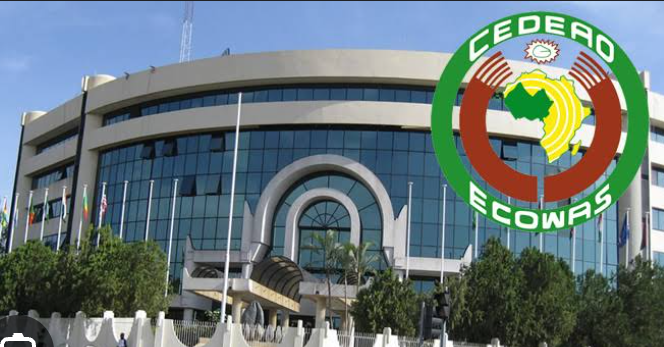News
ECOWAS Court quashes NGO’s claims of rights violations by Nigerian govt

By Kayode Sanni-Arewa
The ECOWAS Court of Justice has quashed the claims of human rights violations brought by a non-governmental organisation (NGO) that asked the Court to hold the Federal Republic of Nigeria liable for breaching its international obligation to protect human rights.
Justice Sengu Mohamed Koroma, Judge Rapporteur who delivered the judgement on Thursday said the Court dismissed all claims of rights violations due to lack of facts and evidence in support of the allegations, and ordered the NGO to pay a nominal cost of N100,000 to the Nigerian government.
The initiating application with suit number ECW/CCJ/APP/40/21 was filed on 22 July 2021 by The Registered Trustees of HEDA (Human and Environmental Development Agenda) Resource Centre, a registered NGO focused on anti-corruption, and non-partisan human rights and development in Nigeria.
The suit was premised on alleged failure of Nigeria to guarantee the rights to life, dignity of the human person, physical and mental health, and right to healthy environment for Nigerians particularly those residing in the oil producing areas of Nigeria.
Relying on Articles 1, 4, 5, 16 and 24 of the African Charter on Human and Peoples’ Rights (ACHPR), the Counsel representing the NGO claimed that despite the prohibition of gas flaring by an Act of government “Association of Gas Reinjection Act of 1979, gas flaring persisted, thereby exposing the people living in the oil producing areas to hazards including cancer, lung damage, deformities in children and skin problems.
He further claimed that environmental pollution from gas flaring contributed to global warming and climate change, adding that Nigeria’s failure to tackle it, has resulted in damaging effects on lives, the environment and monetary loss.
The NGO asked the Court to declare the continuous gas flaring in Nigeria as illegal and a gross violation of fundamental rights, and that the Nigerian government is obliged to stop gas flaring in Nigeria. It also demanded orders of the Court compelling the government to enforce gas flaring regulations against defaulters, and direct it to collect fines from defaulters.
In response, the State of Nigeria denied all the claims made by the NGO. The Counsel for the Respondent averred that the claims lacked facts and evidence, and were baseless, and urged the Court to dismiss them.
In its findings, the Court noted that the Respondent adduced proof of updated laws on regulation of the petroleum industry and other implementation measures taken to improve the environment in oil producing area and decrease gas flaring. It also noted that the NGO did not counter the submissions of the Respondent concerning its efforts to protect host communities.
As a matter of fact, the Court observed the failure of the NGO to provide any evidence supporting its claim of loss of lives, breach of the right to dignity of the human person, breach of right to physical and mental health, and lack of provision of a healthy environment owing to gas flaring. The Court therefore dismissed the claims for lack of proof.
Also on the panel were Justice Dupe Atoki and Justice Ricardo Claúdio Monteiro Gonçalves.
News
Spokesperson Warns Nigerians Against Fake Ministry Of Foreign Affairs Recruitment Scam

By Gloria Ikibah


News
CBN announces revised documentation requirements for PAPSS transactions

The Central Bank of Nigeria (CBN) has announced a revised documentation requirement for transactions conducted through the Pan-African Payment and Settlement System (PAPSS) in Nigeria.
This was disclosed in a statement issued by the apex bank’s acting Director, Corporate Communications, Mrs. Hakama Sidi Ali
The CBN said the new initiative is part of its ongoing commitment to foster seamless intra-African trade, financial inclusion, and operational efficiency for Nigerians engaging in cross-border payments within Africa.
Launched by Afreximbank in partnership with the African Union and the African Continental Free Trade Area (AfCFTA) secretariat in January 2022, PAPSS serves as a centralized payment and settlement platform that enables instant, secure, and efficient cross-border transactions throughout Africa.
By facilitating payments in local currencies, PAPSS minimizes reliance on third-party currencies, reduces transaction costs, and supports the rapid expansion of trade under the AfCFTA.
In a recent circular referenced TED/FEM/PUB/FPC/001/006 issued on April 28, 2025, CBN outlined the key changes to the documentation requirements associated with PAPSS transactions.
The key changes it added take effect immediately and include simplified documentation for low-value transactions, which allows customers to now use basic KYC and AML documents provided to their authorized dealer banks for low-value transactions of up to $2,000 and $5,000 equivalent in naira for individuals and corporate bodies, respectively.
“For transactions above the thresholds, all documentation as stipulated in the CBN foreign exchange manual and related circulars remains mandatory,” the bank said.
Also, the CBN added that applicants are responsible for ensuring all regulatory documents are available to facilitate the clearance of goods, as required by relevant government agencies.
“Authorized dealer banks may now source foreign exchange for PAPSS settlements through the Nigerian foreign exchange market, without recourse to the CBN.
“All export proceeds repatriated via PAPSS shall be certified by the relevant processing banks.
“The Central Bank of Nigeria urges all banks to adopt PAPSS and commence originating transactions in line with this new policy.
“In addition, CBN encourages exporters, importers, and individuals to familiarize themselves with the new requirements and leverage PAPSS for cross-border transactions within Africa,” the statement said.
News
Reps Set Stage for Nigeria’s First Legislative Conference on Renewable Energy

By Gloria Ikibah
The House of Representatives is set to host the country’s first National Legislative Conference on Renewable Energy, aimed at driving new laws, attracting investment, and pushing Nigeria further along its energy transition journey.
This was revealed during a press briefing by the Chairman, House Committee on Renewable Energy, Rep. Afam Victor Ogene, who described the event as a turning point for energy legislation in Nigeria.
He said: “The conference aims at bringing together key stakeholders and industry players to discuss renewable energy legislations, energy transition, renewable energy financing, investment opportunities and related matters.
“It’s about developing a national legislative framework on renewable energy”.
The conference, which is being organised by the House Committee on Renewable Energy in partnership with the Office of the Speaker of the House of Representatives, and the United Nations Development Programme (UNDP), will take place under the UNDP Parliamentary Development Program.
Rep. Ogene noted that recent legal reforms have created space for state governments to play a more active role in Nigeria’s power sector. He pointed to the Fifth Alteration Bill 2022 (No.33), now signed into law, which allows states to legislate on electricity matters within the national grid. Before now, states could only act on off-grid power.
In addition, he highlighted the Electricity Act of 2023, which came into effect in February 2024.
“It permits states to issue licenses for all electricity activities – generation, transmission and distribution across the entire power sector value chain,” he said.
The Committee Chairman further stated that the new National Integrated Electricity Policy, expected in 2025, will guide states in forming new electricity markets, where solar power and other renewable sources will be key to reaching underserved communities.
Ogene explained, “The conference has three clear objectives:
“To promote dialogue among legislators, experts and stakeholders on critical legislative priorities.
“To establish a coordinated platform for federal and state lawmakers, and to produce a clear, time-bound legislative action plan.
“International partners are also on board. The Inter-Parliamentary Union (IPU) will participate, and parliaments from South Africa, Ghana and Gambia have confirmed attendance. Ghana is sending a three-man delegation led by the Deputy Speaker, Rt. Hon. Alban Kingsford Bagbin”.
In another major highlight, the Netherlands-based platform INCLUDE will host a Pan-African Legislative Dialogue session on renewable energy, to be chaired by the Hon. Speaker, Rt. Hon. Abbas Tajudeen.
“The session will focus on how to establish a unified legislative framework on renewable energy development, investment and financing.
“The time has come for us to act. This is not just another conference – it is the foundation of Nigeria’s renewable energy future”, Ogene added.
Expected outcomes from the conference include new policy and legislative reform proposals to boost renewable energy use, as well as draft laws that will encourage public and private sector investment.
Other goals are to enhance collaboration between federal and state lawmakers, raise public awareness, and roll out a practical roadmap for implementation and progress tracking.
The event will also feature a technology showcase of renewable energy innovations and business opportunities.
-

 Metro11 hours ago
Metro11 hours agoGunmen storm University of Benin teaching hospital, kill doctor
-

 Politics23 hours ago
Politics23 hours agoJust in: Ex- Gov Okowa accepts betraying Southern Nigeria, laments running with Atiku
-

 Metro12 hours ago
Metro12 hours agoFCTA destroys 601 motorbikes over violations
-

 News24 hours ago
News24 hours agoBoko Haram Kill Mourners, Kidnap Others In Borno
-

 News12 hours ago
News12 hours agoJust in: FG declares tomorrow public holiday
-

 News3 hours ago
News3 hours agoAlleged money laundering: EFCC produces Aisha Achimugu in court
-

 News23 hours ago
News23 hours agoDeputy Speaker Leads Defection of PDP Stalwart Chris Igwe, 13,000 Followers to APC In Abia
-

 News5 hours ago
News5 hours agoJUST IN: Major General Paul Ufuoma Omu Rtd, dies at 84






